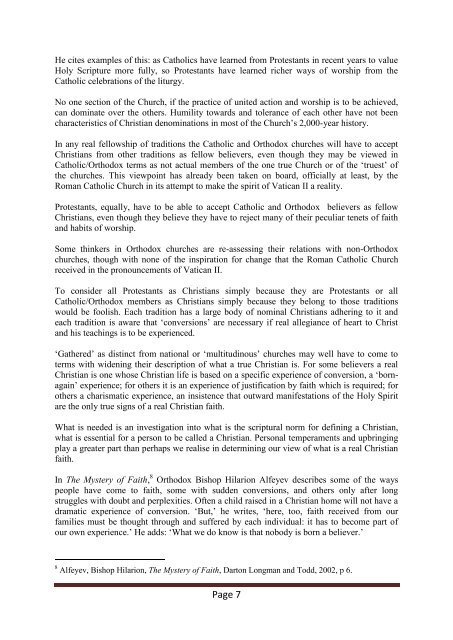Digging Out the Embedded Church - The Maranatha Community
Digging Out the Embedded Church - The Maranatha Community
Digging Out the Embedded Church - The Maranatha Community
You also want an ePaper? Increase the reach of your titles
YUMPU automatically turns print PDFs into web optimized ePapers that Google loves.
He cites examples of this: as Catholics have learned from Protestants in recent years to value<br />
Holy Scripture more fully, so Protestants have learned richer ways of worship from <strong>the</strong><br />
Catholic celebrations of <strong>the</strong> liturgy.<br />
No one section of <strong>the</strong> <strong>Church</strong>, if <strong>the</strong> practice of united action and worship is to be achieved,<br />
can dominate over <strong>the</strong> o<strong>the</strong>rs. Humility towards and tolerance of each o<strong>the</strong>r have not been<br />
characteristics of Christian denominations in most of <strong>the</strong> <strong>Church</strong>‟s 2,000-year history.<br />
In any real fellowship of traditions <strong>the</strong> Catholic and Orthodox churches will have to accept<br />
Christians from o<strong>the</strong>r traditions as fellow believers, even though <strong>the</strong>y may be viewed in<br />
Catholic/Orthodox terms as not actual members of <strong>the</strong> one true <strong>Church</strong> or of <strong>the</strong> „truest‟ of<br />
<strong>the</strong> churches. This viewpoint has already been taken on board, officially at least, by <strong>the</strong><br />
Roman Catholic <strong>Church</strong> in its attempt to make <strong>the</strong> spirit of Vatican II a reality.<br />
Protestants, equally, have to be able to accept Catholic and Orthodox believers as fellow<br />
Christians, even though <strong>the</strong>y believe <strong>the</strong>y have to reject many of <strong>the</strong>ir peculiar tenets of faith<br />
and habits of worship.<br />
Some thinkers in Orthodox churches are re-assessing <strong>the</strong>ir relations with non-Orthodox<br />
churches, though with none of <strong>the</strong> inspiration for change that <strong>the</strong> Roman Catholic <strong>Church</strong><br />
received in <strong>the</strong> pronouncements of Vatican II.<br />
To consider all Protestants as Christians simply because <strong>the</strong>y are Protestants or all<br />
Catholic/Orthodox members as Christians simply because <strong>the</strong>y belong to those traditions<br />
would be foolish. Each tradition has a large body of nominal Christians adhering to it and<br />
each tradition is aware that „conversions‟ are necessary if real allegiance of heart to Christ<br />
and his teachings is to be experienced.<br />
„Ga<strong>the</strong>red‟ as distinct from national or „multitudinous‟ churches may well have to come to<br />
terms with widening <strong>the</strong>ir description of what a true Christian is. For some believers a real<br />
Christian is one whose Christian life is based on a specific experience of conversion, a „bornagain‟<br />
experience; for o<strong>the</strong>rs it is an experience of justification by faith which is required; for<br />
o<strong>the</strong>rs a charismatic experience, an insistence that outward manifestations of <strong>the</strong> Holy Spirit<br />
are <strong>the</strong> only true signs of a real Christian faith.<br />
What is needed is an investigation into what is <strong>the</strong> scriptural norm for defining a Christian,<br />
what is essential for a person to be called a Christian. Personal temperaments and upbringing<br />
play a greater part than perhaps we realise in determining our view of what is a real Christian<br />
faith.<br />
In <strong>The</strong> Mystery of Faith, 8 Orthodox Bishop Hilarion Alfeyev describes some of <strong>the</strong> ways<br />
people have come to faith, some with sudden conversions, and o<strong>the</strong>rs only after long<br />
struggles with doubt and perplexities. Often a child raised in a Christian home will not have a<br />
dramatic experience of conversion. „But,‟ he writes, „here, too, faith received from our<br />
families must be thought through and suffered by each individual: it has to become part of<br />
our own experience.‟ He adds: „What we do know is that nobody is born a believer.‟<br />
8 Alfeyev, Bishop Hilarion, <strong>The</strong> Mystery of Faith, Darton Longman and Todd, 2002, p 6.<br />
Page 7








